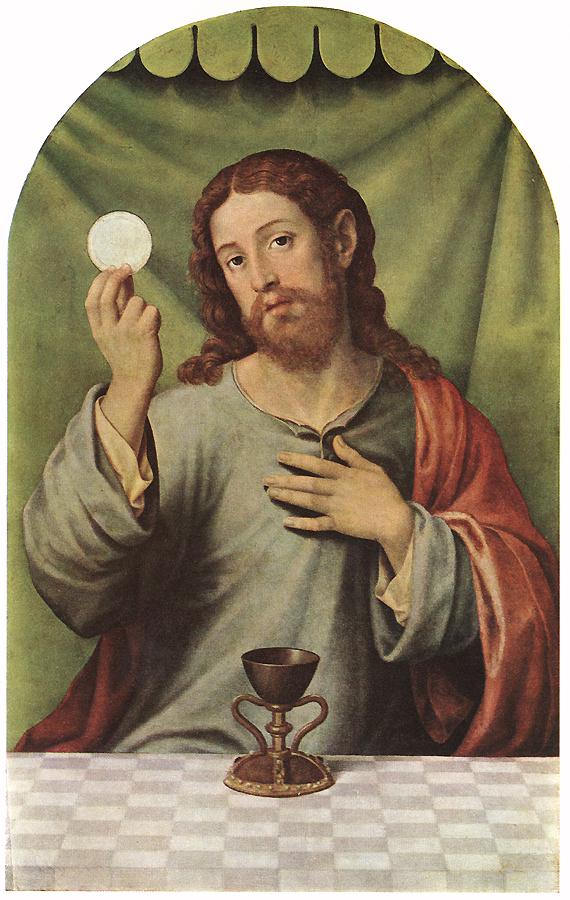Scripture Readings: 2 Sam.18:5-9, 15, 31-33; Ps. 34:1-8; Eph. 4:25-5:2; John 6:35, 41-51 Sermon by Sheila Graham from John 6:35-51 and Ephesians 4:25-5:2
The Bread of Life
Have you noticed that bread is mentioned a lot in the Bible? That’s not a surprise—bread was the main part of daily meals in the Mediterranean world. According to the Anchor Bible Dictionary grain “provided most of the proteins and carbohydrates for humans for centuries and even millennia.” The word “bread” in the Bible can also mean food in general as a sustainer of life. In John 6, Jesus refers to bread symbolically:
I am the bread of life. Whoever comes to me will never be hungry, and whoever believes in me will never be thirsty. (John 6:35, NRSV)
Here Jesus was speaking to a mixed crowd of people, some he had miraculously fed with five barley loaves and two fish the day before. Those people had followed after him hoping he would feed them again. He used their physical hunger to teach a spiritual lesson:
I am the bread of life. Your ancestors ate the manna in the wilderness, and they died. This is the bread that comes down from heaven, so that one may eat of it and not die. I am the living bread that came down from heaven. Whoever eats of this bread will live forever; and the bread that I will give for the life of the world is my flesh. (John 6:48-51, NRSV)
The bread that Jesus had miraculously supplied the people the day before sustained them for a few hours. They were already hungry again. Jesus reminds them of manna, another source of miraculous food, which also kept their ancestors alive, but only temporarily. Jesus compares these breads, both miraculous feedings, to the bread he offers—the living bread from heaven—himself. Jesus is the bread of life, the living bread. Those who eat of this bread will live forever, he said. That’s the bread they should be seeking, instead of following him around hoping to be fed and entertained with another miraculous feeding.
Some in the crowd knew Jesus’ family. They knew Joseph and Mary, perhaps personally. They were offended by Jesus’ often-repeated saying that he “came down from heaven.” Here was a man they knew, whose parents they knew, who claimed to have personal knowledge and authority from God. Jesus also seemed to be putting himself before their prophet Moses and the giving of manna in the wilderness.
The people began to mutter and complain among themselves. Who does this young upstart think he is!
Then the Jews began to complain about him because he said, “I am the bread that came down from heaven.” They were saying, “Is not this Jesus, the son of Joseph, whose father and mother we know? How can he now say, I have come down from heaven?” Jesus answered them, “Do not complain among yourselves. No one can come to me unless drawn by the Father who sent me; and I will raise that person up on the last day. It is written in the prophets, ‘And they shall all be taught by God.’ Everyone who has heard and learned from the Father comes to me. Not that anyone has seen the Father except the one who is from God; he has seen the Father. Very truly, I tell you, whoever believes has eternal life.” (John 6:41-47, NRSV)
They were taking Jesus’ statements literally, not understanding the spiritual analogies he was making. But bread and flesh used in spiritual symbolism was not new to them. Countless animals had been sacrificed over the millennia for the sins of the people. The flesh of these animals was then cooked and eaten. Bread was used as a special offering in the Temple. The Bread of Presence, which was also eaten by the priests, was a symbol of the covenant between God and Israel (Lev. 24:5-9).
But what they heard was Jesus saying that the eating of his flesh and the drinking of his blood was the key to eternal life. Without the discernment given by the Spirit, it was impossible to understand what Jesus meant. The drinking of blood was especially revolting to people long taught that it was a sin. When Jesus spoke of eating his flesh and drinking his blood, it was a very difficult saying. It had to be spiritually discerned. Even some of his own disciples (the Bible says “many”) turned away and followed him no more at this point.
When Jesus asked the 12 disciples if they would also leave him, that’s when Peter famously asked:
Lord, to whom can we go? You have the words of eternal life. We have come to believe and know that you are Holy One of God. (John 6:68-69, NRSV)
Perhaps the 12 were as confused as the others; they didn’t usually catch on too quickly. Yet they believed in Jesus and trusted their lives to him, even their eternal lives. By faith, they stayed.
Perhaps they remembered Jesus’ words about eating his flesh and drinking his blood when he later instituted the sacrament of Communion at the Last Supper. They certainly did following Jesus’ resurrection and the coming of the Holy Spirit. It all became clear then.

(public domain via Wikimedia Commons)
We learn from the writings of the apostle Paul that Holy Communion was a sacrament performed regularly in the early church—apparently every time they met. What happens when the bread and wine of Communion are consecrated and ingested has been debated over the centuries, though most Christians agree that these elements somehow are presenting to us the body and blood of Jesus. By partaking of the elements, we are partaking of Christ—he is feeding us with his own glorified humanity. As this occurs, we are told in Scripture that the Holy Spirit is forming us to be the body of Christ on earth.

Henri Nouwen, Christian author and professor, was also a priest. When he would offer the consecrated bread and wine of Holy Communion to his congregants, he would often think deeply about what he was doing. Here is what he wrote:
These words [spoken in serving communion: taken, blessed, broken and given] summarize my life as a priest because each day, when I come together around the table with members of my community, I take bread, bless it, break it and give it. These words also summarize my life as a Christian because, as a Christian, I am called to become bread for the world: bread that is taken, blessed, broken and given. Most importantly, however, they summarize my life as a human being because in every moment of my life somewhere, somehow the taking, the blessing, the breaking and the giving are happening. (Life of the Beloved)
Though none of us, Nouwen included, can fully understand all that Holy Communion entails, and how all that it conveys “works,” he clearly understood that, somehow, eating the bread and drinking the wine makes us one with Christ and with each other. We are in Christ and Christ is in us. We truly are the body of Christ. As we learned in the sermon last week, this is the indicative of grace. What then is the imperative of this grace—what is our response to this, the greatest of all gifts to humankind?
The answer is that, just as the 12 disciples did, we come to Jesus believing in him, accepting his forgiveness and love. With gratitude, we embrace and celebrate the gift of our salvation. In receiving, we experience the freedom from sin and guilt and shame that are ours in Christ—gifts that are ours, not just today, tomorrow, next week or next year, but forever. What greater gift could there be? It’s only through the Holy Spirit that we are coming to more fully comprehend what Jesus has done for us.
As part of the body of Christ, how then should we live as Christians? How should we respond to this greatest of gifts? The apostle Paul tells us:
Putting away falsehood, let all of us speak the truth to our neighbors, for we are members of one another. Be angry but do not sin; do not let the sun go down on your anger, and do not make room for the devil. Thieves must give up stealing; rather let them labor and work honestly with their own hands, so as to have something to share with the needy. Let no evil talk come out of your mouths, but only what is useful for building up, as there is need, so that your words may give grace to those who hear. And do not grieve the Holy Spirit of God, with which you were marked with a seal for the day of redemption. Put away from you all bitterness and wrath and anger and wrangling and slander, together with all malice, and be kind to one another, tenderhearted, forgiving one another, as God in Christ has forgiven you. Therefore be imitators of God, as beloved children, and live in love, as Christ loved us and gave himself up for us, a fragrant offering and sacrifice to God. (Eph 4:25-5:2, NRSV)
According to Paul, through these virtuous acts, we do something quite profound—we imitate Christ, who offered himself up to God for our benefit. The Greek word here translated “offering” refers to the grain offering in the Jewish sacrificial rites (Expositor’s Bible Commentary). In Christ, we identify with God himself, and through Christ our lives are an acceptable offering and sacrifice to God.
Now, we could make a list of these virtues, and stick it on our refrigerator, or tack it on our bulletin board. Doing so might be a good reminder. However, just to be clear, these aren’t new rules and regulations Paul is giving to replace those we’ve set for ourselves in the past. Don’t forget, living out these virtues will not bring anyone closer to Christ and to his salvation. Living this way is our response to Christ’s sacrifice already given. Our obedience doesn’t save us—it’s our response to Christ’s sacrifice for us. Paul is writing to people who are already Christians, and calling forth their response (the imperatives of grace) to the reality of who they already are in Christ (the indicatives of grace).
In conclusion, let’s not make rules for ourselves where they weren’t intended. We are set free by Christ’s sacrifice for us to love God and love people. These aspects of the Christian life that Paul writes about here in John 6 reflect that love. And, even the ability to do join with Jesus in that love is a gift of the Holy Spirit—we are not able to love like that on our own. As Christians we don’t look to rules and regulations; we look to Jesus, who says this:
I am the living bread that came down from heaven. Whoever eats of this bread will live forever; and the bread that I will give for the life of the world is my flesh. (John 6:51, NRSV)
In Christ, we identify with God himself, and through Christ our lives are an acceptable offering and sacrifice to God.



Please note that comments are moderated. Your comment will not appear until it is reviewed.